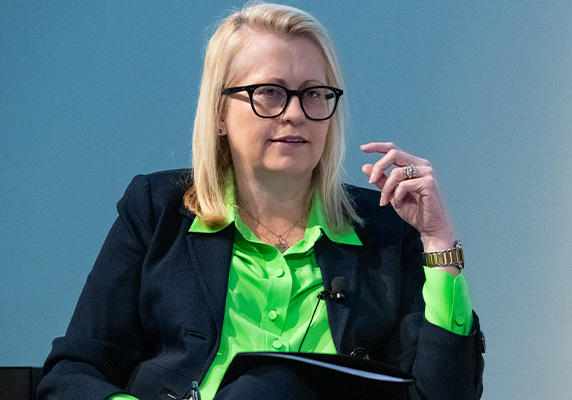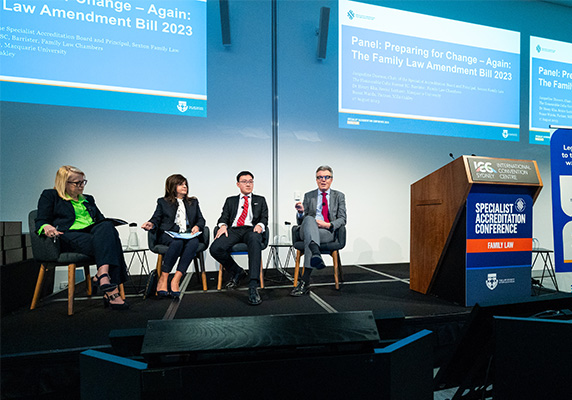The Family Law Amendment Bill 2023, currently before Parliament, proposes significant changes to shared parenting arrangements in Australia. At the Law Society of NSW's Specialist Accreditation conference, a panel of experts offered their views on the Bill's proposals.
The Family Law Amendment Bill 2023, currently before Parliament, has been dubbed the most significant change to parenting arrangements in Australia since 2006. It proposes an overhaul of the legal framework, initiated by the Family Law Act 1975 (Cth), which has been used to resolve parenting disputes in family law matters.
The purpose of the Bill, according to a Parliamentary statement, is “to ensure that the best interests of children are prioritised and placed at the centre of the family law system … The Family Law Act 1975 has become convoluted and is not meeting the needs of separating families.”
The Bill, and submissions on its proposals, will result in amendments both to the Family Law Act and the Federal Circuit and Family Court of Australia Act 2021 (Cth).
Welcomed by the legal profession
How positive will these changes be for the children of divorced parents, caught in the middle of contesting parenting arrangements? A panel of family law experts recently shared their views and concerns at the Law Society of NSW’s 2023 Specialist Accreditation Conference. The conference covered five specialist streams of law: family, business, property, personal injury and wills & estates law. In the family law stream, the panel, titled “Preparing for change – again: The Family Law Amendment Bill 2023″, offered one of 11 professional development sessions for legal specialists.
“There have been numerous changes over the years to the way family law is conducted and to the legal principles upon which they’re based. Some of the aspects of the Bill are controversial, but in broad terms [it] has been welcomed by the legal profession,” said the panel’s moderator, Jacqueline Dawson.

Dawson is Principal Solicitor of Sexton Family Law and an Accredited Specialist in Family Law. She has served as a member of the Law Society’s Specialist Accreditation Board, is Co-Chair of the Law Society’s Family Law Committee, and Deputy Chair of its Professional Conduct Committee.
“The first change the Bill proposes,” Dawson said, “is about amending the parenting order framework, repealing the presumption of parental shared responsibility, and the requirement to consider equal time with each parent. This effectively reverses the changes that occurred in 2006 [when equal shared responsibility was introduced].
“I think a lot of practitioners would say that those 2006 changes were a failure,” Dawson added.
In the shadow of a mistaken understanding
The panel’s views are echoed in a statement by the Law Council of Australia. The Law Council ‘s President, Luke Murphy, said, “the Law Council supports reform to Australia’s family law system that simplifies the facilitation of the resolution of parenting disputes, while continuing to place the best interests, safety and wellbeing of any child to a family law proceeding at the centre of the decision-making process.
“The Law Council also supports the proposed repeal of the presumption of equal shared parental responsibility and the related mandatory consideration of time provisions.
“Presumptions can unreasonably fetter the discretion of the court and provisions around parenting should not prioritise or favour any particular parenting arrangement, as is currently the case. Parental responsibility should be a matter for the court to determine in each case if needed, having regard to the best interests of the child as the paramount consideration.”
‘Parental responsibility should be a matter for the court to determine in each case if needed, having regard to the best interests of the child as the paramount consideration.’
Murphy said, “The Law Council is concerned that the existing presumption, and mandatory consideration of equal time in certain circumstances, has caused confusion, conflict and unfounded expectations for parties, increasing risks for victim-survivors of domestic and family violence, both adults and children. It has resulted in additional burdens for vulnerable parties in having to persuade the court to displace the presumption because of family violence. It is expected that poor outcomes for some children have been agreed by parents, in the shadow of a mistaken understanding of the law.”
What is in their best interests
The focus of the Act will shift from the entitlement of the parents to what is “appropriate and safe for the child,” panel member Dawson said at the start of the panel discussion.
Dr Henry Kha provided a history of the evolution of Australia’s family law since 2006 to support this view. Kha is a senior lecturer at Macquarie University, with family law as his main research interest. He has been a legal associate in the Family Court, and has made many radio and TV appearances discussing family law issues.
Kha said, “in 1995 the Family Law Reform Act was introduced and there was a shift in language from guardianship, custody and access to parental responsibility, care and contact. But while there were changes in the language used to describe family law matters, the reform didn’t change things in substance.”
“And by the 2000s there was a push towards more contact. This saw the emergence of men’s rights groups, and they became very influential in lobbying parliamentarians. And that resulted in the 2006 family law amendments that introduced the presumption of equal shared parental responsibility.
“Also culturally there have been significant changes in the past two decades. … in the 2000s same-sex parenting was viewed as atypical. So culturally the profession has changed.”

Kha believes the proposed amendments in the Bill are more child focused, in particular the proposed amendments to section 60CC, which formerly contained a “long list of factors that the court is to take into account.”
“The Bill simplifies the approach to deciding what is in the child’s best interests,” Kha explained. “Currently, there are ‘primary considerations’ – essentially, safety, and a ‘meaningful relationship with both parents’, and a list of 14 ‘additional considerations’, a total of 21 factors.
“The Bill proposes five factors, and also a ‘catch-all’ provision that includes everything else relevant,” Dawson said. “They would still include safety in a relationship with parents and other significant people, safety permitting. There would be a standalone best interest factor relating to Aboriginal and Torres Strait Islander children … broadly, it’s a specific acknowledgment of an Indigenous child’s right to enjoy and maintain connection with their culture. There’s clarification in relation to when a court can vary an existing final parenting order … There’s a provision clause that requires children in any proceedings to do with them to have a voice and a right to be heard so this [Act] is familiarising that obligation.”
Kha said, “The factors in section 60CC will be more in line with the UN Convention on the Rights of the Child, particularly with Article 12 and the right of the child to express their views.”
A shift in the burden
Panel member Susan Warda is a partner at national law firm Mills Oakley, a family law Accredited Specialist, and a trained parenting coordinator. Warda said the proposed changes in terms of equal shared responsibility will have a significant impact.
“The change will be a sign for those people, I think, who for some 16 years have at the very least been able to secure a shared parental responsibility … sometimes in circumstances where it really has been problematic, and the communication about fairly significant things like health and education has been fraught with problems for a lot of clients.”
It was in 2006 that the Howard Government enacted reforms championing shared care for children in separated families, based on the idea that most children were better off spending as much time with each parent as possible. But research commissioned by the federal Attorney-General’s office subsequently found that shared care, and equal time with both parents, is not in the best interests of children in families where there is a high level of conflict between the parents.
“So I think by removing the presumption [of equal shared responsibility],” Warda said, “that will impact the advice we give people.
“And the advice we give mothers is obviously changing and will change once these amendments are effective … mothers who have struggled in a situation where there’s been significant family violence for them, their children, and have been forced to try to cooperate … in 2006 we were saying to clients it’s very difficult to get a sole parental responsibility order.”
The Hon Colin Forrest SC also shared his expertise on the panel. Forrest, formerly a judge of the Family Court and now a mediator and arbitrator, said with the proposed amendments “the evidentiary burden is going to shift from the parent who wants to rebut shared parental responsibility to the parent who actually wants to convince the court that shared parental responsibility is actually in the child’s best interest … the parent who is going to push for equal shared responsibility is going to have to work a lot harder to get it.”
‘The parent who is going to push for equal shared responsibility will have to work a lot harder to get it.’
If the Act is amended as proposed, Forrest said, “it will be harder for the dads to get equal shared parental responsibility, and if they want it the burden will be on them to prove they can cooperatively parent, that they can communicate well, are best interest focused, that they will promote the other side’s relationship, they won’t talk badly about the mother to the kids etcetera. And it will also encourage them perhaps to go to courses and present the evidence: ‘I’ve been to these parenting after separation courses and communicating more effectively courses’.”
“And so it might drive a little bit of change and improve things so that joint shared parenting responsibility orders can be made more readily and appropriately in cases.”
Positive only for conscious uncoupling
Forrest is less optimistic about the effects of another change proposed by the Bill: amending Part XIB of the Family Law Act, which sets out the court’s powers to deal with ‘vexatious proceedings’, by empowering the court to deal with proceedings that are unmeritorious and harmful, as well as vexatious.
Under the proposed change, the court would have the power to make a “harmful proceedings order”, prohibiting one party from instituting proceedings against the other party without the leave of the court. This would apply for child-related proceedings if the child who is the subject of the proceedings would suffer harm if the first party instituted further proceedings against the other party.
In this case, Dawson says, “a party would need to seek leave before filing further proceedings, obviously aimed at reducing systems abuse.”
However, Forrest suggested this new provision will most likely only see positive change where the cases are low conflict: “where there is ‘conscious uncoupling’ by parents who are great co-parents, who are child-focused, get on well, are likely just to continue to do what they generally do, which is to walk away and reach agreement fairly quickly and fairly amicably, which includes sharing parental responsibility, whether there’s a presumption or not.”
“It won’t make much difference in really difficult parenting cases,” he said, adding, “In the high conflict cases it will drive more applications for review of the parenting orders.”
The Amendment Bill also clarifies when a court can vary an existing final parenting order. Kha said, “what is different is that the section expressly refers to promoting the best interests of the child. And you see that consistently throughout other parts of the legislation. There is a stronger reinforcement of the paramountcy principle … there is express positive mention that any variation of a final parenting order ought to be final and there has to be a compelling reason for a variation of the order to take place.”
An opportunity for children to express their views
It was significant, in Dawson’s view, that the Amendment Bill permits the appointment of Independent Children’s Lawyers (ICLs) in matters brought under the Hague Convention and also requires that ICLs meet and hear the views of a child. (The Hague Convention is the main international agreement covering international parental child abduction,)
Section 68L of the Family Law Act provides for the independent representation of a child’s interests, by enabling the court to appoint an ICL. The proposed amendment will expand the duties of an ICL, as explained in the Explanatory Memorandum to the Bill, by including a requirement for the ICL to meet with the child and to provide the child with an opportunity to express any views in relation to the matters to which the proceedings relate, “unless exceptional circumstances apply”.
This provision, according to the Explanatory Memorandum, “will ensure that the child is provided an opportunity to express views and to be heard, consistent with Article 12 of the [United Nations Convention on the Rights of the Child].”
Warda said, “NSW is one of the few states where in most matters where there is a child [involved] the ICL meets with the child. And that does not occur across the country. So the changes will make it mandatory for ICLs in other states, but it won’t change the way ICLs have been running their matters because you’ll find that they always interview a child.
“Before, if you had a Hague matter you wouldn’t have had an ICL unless [the matter had] gone on appeal. Now you will have an ICL appointed from the outset.”
Dawson raised the question, “Will this mean an increased workload and expectation so private lawyers might leave the panel, whereas those who are inhouse or at legal aid will continue absorbing the extra workload?”
She added, “The court is really begging, pleading, entreating senior practitioners to do the ICL training and accept matters as ICLs. It’s seen as a really valuable contribution people can make to the profession.”
“This reform has also been welcomed, although as with many other aspects of the Bill, giving ICLs wider responsibilities will make no difference without proper resourcing through the existing funding channels.”
‘Giving Independent Children’s Lawyers wider responsibilities will make no difference without proper resourcing through the existing funding channels’
Forrest supported Dawson’s view. “There needs to be pressure from practitioners to increase the ICL remuneration and support the Legal Aid offices to ask for more funding, because of the extra work that’s going to be imposed by these amendments.”
Recognising a history of family violence
The Senate Legal and Constitutional Affairs Legislation Committee issued its report on the Bill a few weeks after the panel met. While the Committee agreed that “the core list of factors” in the proposed section 60CC will “promote a more holistic approach to determining the child’s best interests,” it viewed the list as incomplete.
The Committee noted: “The core list omits one very important factor: a history of family violence, abuse and neglect involving the child or a member of the child’s family. Adult victim-survivors and their advocates have explained the great need for recognition of this history when seeking safety through the family law system. The best interests considerations would not be complete without this express recognition and protection for separating families.”
The Committee also recommended that the proposed amendments to the Act “incorporate the language and concepts from subsection 60CC(6) of the Family Law Act 1975, to better recognise and protect the right of Aboriginal and Torres Strait Islander children to enjoy their culture.”
The Senate Committee’s recommendations highlighted the importance of including in the Family Law Act two issues the Bill has raised. The report called for the Act to:
- “incorporate the concepts of kinship and child-rearing practices” relating to Aboriginal and Torres Strait Islander people
- “enable the objections of the child to a return order to be taken into consideration under the Hague Convention on the Civil Aspects of International Child Abduction”.
In terms of access to ICLs, the Committee noted “the need for adequate funding to enable access to independent children’s lawyers … in the absence of additional funding, the amendments could lead to unintended consequences.”
The Family Law Act amendments are slated to be made in the next few months. The Specialist Accreditation conference panellists, and their peers across the family law sector, are hoping for the incorporation of amendments that will truly be “in the best interests of the child”.
Specialist Accreditation is a structured peer assessment program that has been run by the Law Society of NSW since 1992. The program enables practitioners to gain recognition as an expert in one or more of 13 areas of law. More than 1700 NSW solicitors have Specialist Accreditation. The annual Specialist Accreditation Conference is a key method for specialist practitioners to access knowledge about their chosen fields.




